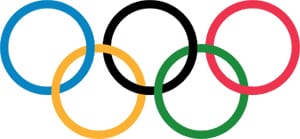 In an Op-Ed piece published earlier this week, The New York Times highlights an important upcoming election that few know about but nonetheless has the potential to impact many: the election of a new president of the International Olympic Committee. The September vote will be the first in 12 years and may in fact be, "the last chance
In an Op-Ed piece published earlier this week, The New York Times highlights an important upcoming election that few know about but nonetheless has the potential to impact many: the election of a new president of the International Olympic Committee. The September vote will be the first in 12 years and may in fact be, "the last chance
for many years to reform the committee's approach to repressive
governments that seek to host the [Olympic] games." The author of the article, Human Rights Watch's Minky Worden, argues that "It is imperative that the
committee elect a president willing to lead, not cave in, on this issue." Current IOC President Jacques Rogge has not left behind a sterling legacy when it comes to the IOC's commitment to human rights let alone its own charter:
The
12-year term of the current president, Jacques Rogge of Belgium, will
be remembered in large part for the glaring contradiction between the
I.O.C.'s explicit vision of its lofty role in the world (as outlined in
the rules and guidelines of its charter) and the fact that Mr. Rogge has
been responsible for two Olympics with extensive human rights
violations: the 2008 summer games in Beijing and the 2014 winter games
in Sochi, Russia, which start in less than six months.
To
host the Olympics, governments and cities pledge not only to build
sparkling new stadiums but also to uphold the I.O.C.'s “Fundamental
Principles of Olympism”: respect for human dignity and press freedom,
and a rejection of “any form of discrimination.” But the I.O.C. under
Mr. Rogge has failed to enforce its own rules.
The
2008 Beijing games, which cost an estimated $40 billion, led to a host
of rights violations, including abuses of domestic migrant workers who
were building Olympic infrastructure and a harsh clampdown on civil
society and media, with punishment (including imprisonment) for those
trying to protest.
Now
the I.O.C. is preparing to stage another Olympics in a host country
that almost appears to be taunting organizers and sponsors by flagrantly
flouting its pledge.
Worden also points out that given the IOC's lackluster group of 98 voting members, comprised of "mostly sports federation leaders and members of royal families," only one of whom has criticized Russia's discriminatory laws, it will be up to corporations who have the power of the all mighty dollar behind them to push for change:
Before
another I.O.C. president is selected, the corporate sponsors who make
the Olympics possible should insist that the president enforce the
committee's own rules about human rights. Unless sponsors and
franchise-holders like NBC, Coca-Cola, G.E., McDonalds and Visa want to
risk being associated with an officially homophobic Olympics, they must
find their voices — before the next I.O.C. head is anointed.



